
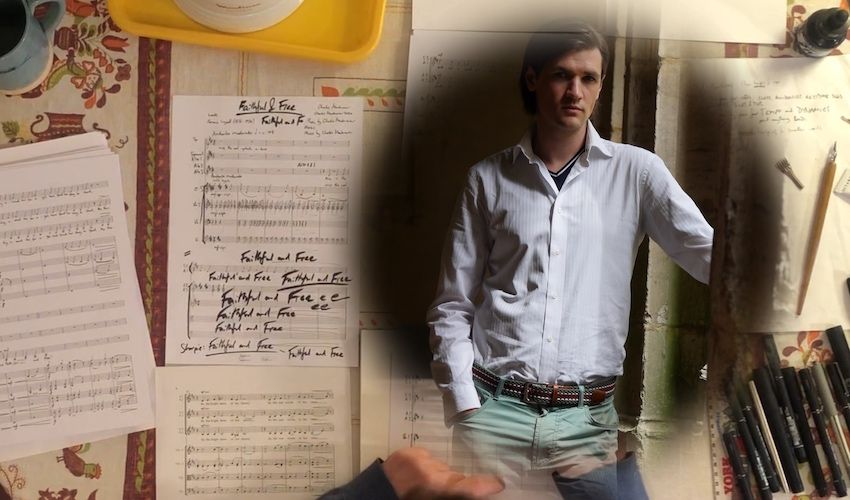
From writing music for Hollywood, to teaching at two of Jersey’s schools, this composer is likely best known as the talent behind the symphony performed on the WWI centenary.
Born and bred in Jersey, Charles Mauleverer’s latest commission was to be performed live in Liberation Square on 9 May as part of the events to mark the 75th Anniversary of Liberation, but, due to covid-19, those plans have had to change.
Stay at home and social distancing rules have meant changes to the programme on Liberation Day and to the way Charles’ specially composed choral and string piece will be performed.
Instead of a live audience in the open air, 'Faithful and Free' will be broadcast online via ArtHouse Jersey Presents, having been recorded over the previous weeks.
Video: Charles Mauleverer recorded 'Faithful and Free' during lockdown.
Organising that seems to be as much of a challenge as writing the piece in the first place, but it’s a challenge that this composer and amateur stone-skimmer took in his stride.
That’s right, Charles likes to unwind on one of the Island’s beaches seeing how far he skim a stone across the water and every year he makes the trip to Scotland to compete in the World Stone Skimming Championships on Easdale Island.
“When you see the best in the world, it really is a beautiful thing to behold, but for me, it’s also just as much a form of meditation. A good stone should be flat and rounded, though other shapes can work, not so light that it is affected by the wind and not too heavy to affect the distance thrown, so it slightly depends on the location and conditions.”
Video: Charles training for the championships at Le Hocq. (Charles Mauleverer)
His talent for music was spotted when he was about ten and, after applying to several specialist schools, he went to Winchester College where the curriculum demanded playing two instruments a day as well as singing in the magnificent cathedral.
“There was a huge emphasis on practice and singing, and by the time I was 13, I think I was sick of singing. I’d reached Grade 8 and I just wanted to be out playing football and doing lots of sports.”
But it was here his love of composing and a fascination with composers began.
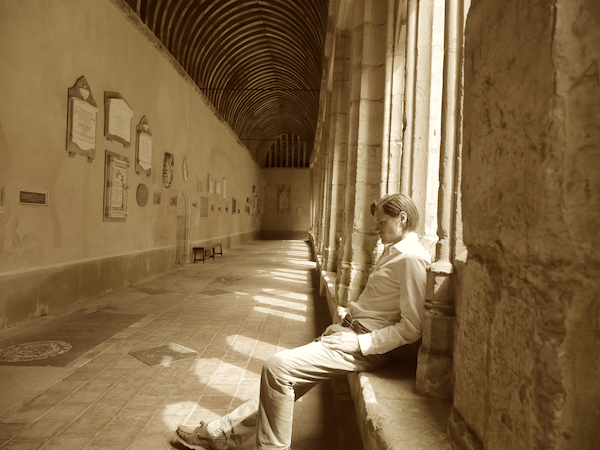
Pictured: Charles went to Winchester College where the curriculum demanded playing two instruments a day as well as singing in the magnificent cathedral.
“Being practically locked in lots of practice rooms, I started doing more improvisation and delving into my imagination than necessarily following what exactly was on the page. So that just blossomed.”
Oxford and the Royal College of Music followed, as did work with orchestras and on films. Fast forwarding to 2018, one of the key moments of the weekend of Island events to mark the centenary of the Armistice was Charles’ five movement symphony, Two Brothers, which was performed by the Jersey Chamber Orchestra in a packed Fort Regent.
By his own admission, Charles likes to go into an unhealthy amount of detail when he is working through a commission. For the Armistice symphony, he spoke to historians, read books and visited the battlefields where soldiers from Jersey fought.
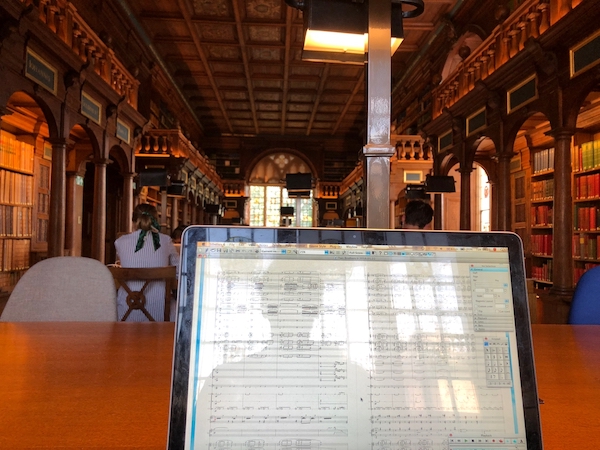
Pictured: When it comes to writing a music score, the process Charles uses shares elements that architects, and mathematicians might recognise.
“I read diaries of soldiers who were there, and one line in one of those books told me about these two very young brothers and I started learning about what were essentially child soldiers in the First World War. I went on a physical journey through France and Belgium and all the cemeteries and monuments there, and I think without that process and journey, the piece might’ve ended up a little different.”
When it comes to writing a music score, the process Charles uses shares elements that architects, and mathematicians might recognise.
“There’s quite often a mathematical strand somewhere in a work. Not always, but in that piece, there were five movements; one for each year of the war. It began with the numbers of that year played by most of the orchestra which would then set the harmonic scene for the whole movement.
"So, there’s sometimes an almost secret role that a bit of maths might play.”
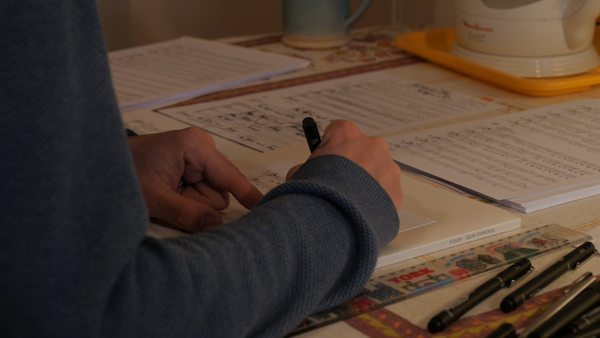
Pictured: Charles at work on 'Faithful and Free'.
But to make his latest piece work, it has needed even more creativity because of Covid-19. It was a simple enough request to write a four to six minutes piece commemorating our 75th anniversary of Liberation. It would need to work in collaboration with the Musical Originals Singers, but other than that, there wasn’t a huge amount of further detail to go with the brief.
“I approached the Channel Islands Occupation Society and they said I should meet three Occupation survivors: Bob le Sueur, Trevor Green and Stan Keiller. I interviewed Bob and Trevor because they are on the island. I was in correspondence with Stan because he lives in England.
“And I asked them about what they wanted to see in a new piece of music, and I asked them loads of other questions to do with the Occupation and how they felt it ought to be remembered. There are such strong feelings about this across the island that I wanted to go back to those people who lived through it and ask their opinions.”
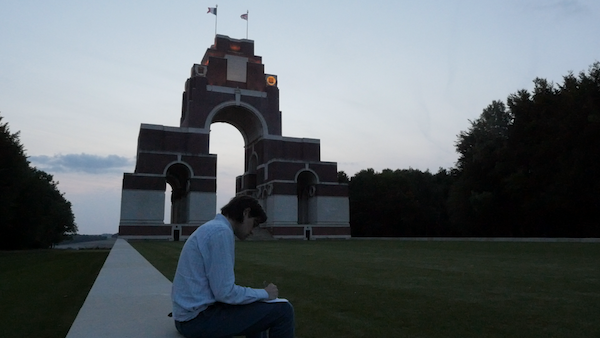
Pictured: Charles composing at Thiepval in 2017.
It was Stan Keiller who pointed Charles towards a book published just after the war called Jersey in Jail, 1940-45. Written by Horace Wyatt and featuring illustrations by Edmund Blampied, there was one poem in particular called Faithful and Free, which had originally been written by Wyatt for an operetta and performed at the Jersey Opera House during the Occupation.
“They managed to sneak it under the German’s noses by essentially pretending it was about Charlemagne, but it’s very clearly about love of homeland - Jersey and of Britain - and the kinship between the two.
“There’s one last verse which was kept secret and only released after the war. It was about being held in chains and waiting for relief which Horace Wyatt only revealed afterwards.”
Pictured: Charles was humbled to be commissioned by the States of Jersey to write the song.
Rather like the people it was written about, those that are due to perform Faithful and Free are also experiencing restrictions on freedom. Instead of being able to practice together, each singer and each musician will have to record their part alone.
They’ve been sent a set of instructions and an audio file of the music to accompany them. They’ve also been shown how to make a ‘popper-stopper’, a homemade device that stops the singer making a popping or thumping sound when the letters P or B are sung into a microphone. All you need is a coat hanger and a pair of tights.
‘It should be interesting to see how the singers get along with this challenge because I don’t know how much of this they’ve done before, but they are all really confident and brilliant young singers,’ Charles explained.
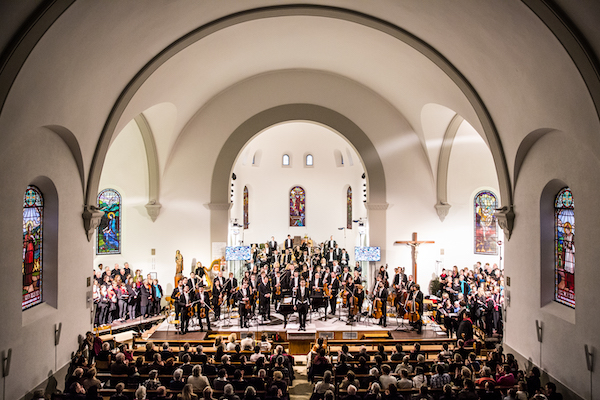
Pictured: Instead of recording together, each singer and musician has had to record their part alone.
They will be accompanied by a small string ensemble which has had to shrink because one of its members, a doctor, is needed in the current crisis.
But this type of performance has been done before. Virtual choirs have performed at the London Olympics, on TV and at events organised all over the world. And during Coronavirus, the Lockdown Orchestra has been performing along with other similar online orchestras.
These are uncertain times for those that rely on music to make a living. Concerts and performances have been cancelled, and TV programmes and films which ordinarily need music to be composed are not being made. It’s also hit another project - One Home: An Environmental Symphony – which Charles has written and was hoping to see performed in Jersey later this year.
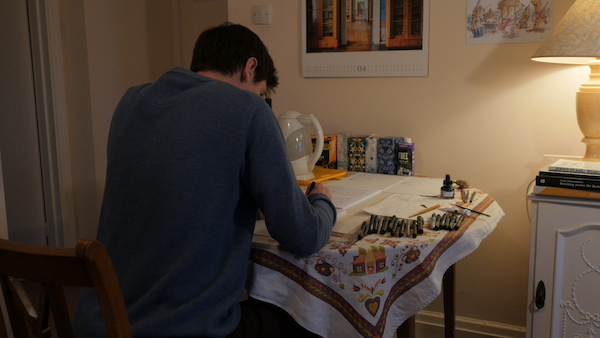
Pictured: Despite the changes on Liberation Day, this latest project has been a deeply rewarding and meaningful one for Charles Mauleverer.
“It has changed things for everyone in my profession. We don’t know when concerts are going to take place. We were going to have the Environmental Symphony put on later in the year in Jersey which doesn’t look like it’s now going ahead.”
Despite the changes on Liberation Day, this latest project has been a deeply rewarding and meaningful one for Charles Mauleverer, but it has been tinged with sadness. One of the three Occupation survivors, Stan Keiller, passed away in March before they’d even had the chance to meet in person.
“I had an email from his daughter to say that he’d passed away. He died before I could let him know what an amazing help he had been. He had been the person to find these lyrics and it was before he could hear the piece.”
Pictured: The song should have been played on Liberation Square.
Undaunted by corona virus, the performance will go ahead, broadcast in a video showing images of those singing and playing paired with photographs of the island taken by Gina Socrates and Shannon Le Seelleur.
“In my mind I was conceptualising this to be taking place in Liberation Square itself. I know so many people had put an enormous amount of effort into planning this, it’s a huge shame,” said Charles.
“But it’s just an enormous privilege to be honest, it really is. For the Island, the Occupation has been just such a huge part of still living memory and it’s everywhere you look.
"It’s humbling really to be asked, which is why I went through the process in order to write this music, to find the text, and to get the endorsements from the people for whom this means a great deal.”
Comments
Comments on this story express the views of the commentator only, not Bailiwick Publishing. We are unable to guarantee the accuracy of any of those comments.